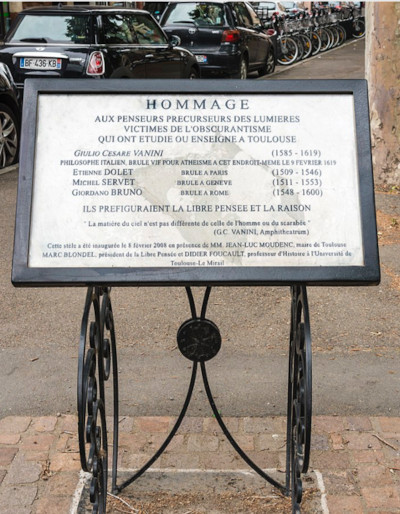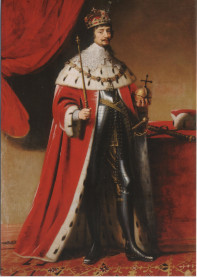SPIES
FOR THE POPE
A picaresque spy story of a free thinking philosopher
(and his some time lover) recruited by the Vatican for an impossible mission:
to prevent the Thirty Years War.
ABOUT
THE PLAY
 |
HOMMAGE To those thinkers, precursors of the Enlightenment Victims of obscurantism Who studied or taught at Toulouse They prefigured free thought and reason Giulio Cesare Vanini, 1585-1619 burned at the stake in Toulouse, February 1619 [Oddly, it says that Vanini was "burned" like the others. He was actually garrotted.] |
"Spies for the Pope" by Douglas Lackey is a sweeping historical drama that charts the tragic career of Giulio Caesare Vanini (1585-1619), an Italian philosopher recruited by the Vatican, in Lackey’s telling, for an impossible mission: stopping the Thirty Years War by reconciling through diplomacy the Catholic and Protestant antagonisms of key European countries. Theater for the New City (TNC), which has been Lackey's theatrical home since 2003, will present the work's premiere run November 9 to 26. Director Alexander Harrington has collaborated with Lackey on four prior plays and shares his interest in historical drama. All of Lackey’s previous plays have been praised for their deft mixtures of philosophy, romance and politics.
 |
L: Giulio Cesare Vanini's bust
can be seen at “Villa Comunale Giuseppe Garibaldi” in
Lecce (Via XXV Luglio). It was sculpted by Eugenio Maccagnani, an
artist from Lecce, in 1886. R: Medallion by Ettore Ferrari on base of Giordano Bruno statue, Campo de' Fiori, Rome |
Giulio Cesare Vanini, the Italian philosopher, scientist and “the prince of libertines,” was among the first Western scientists to view the world as entirely governed by natural laws. His attempts to remain loyal to both science and religion led to his execution in 1619 on a false charge of atheism. Admirers of Vanini in the 19th century placed a plaque on the site of his execution reading “to a martyr for freedom of thought.” In 2015 the plaque was spray-painted by an anonymous fanatic with the words “He got what he deserved.” The audience is invited to reach its own verdict on this question.
Eric Loscheidern (R) plays Giulio
Cesare Vanini and Jordan Stidham (L) plays Brother Markus. Photo
by Jonathan Slaff. |
The play is a continent-trotting, picaresque spy story. It unfolds with two Capuchin Friars, Vanini and his companion (and some time lover) Brother Markus, crusading for Catholicism across Europe. Markus proves to be a dangerous acolyte who is progressively susceptible to the Protestant cause. Vanini himself falls under the spell of Elizabeth Stuart, the Protestant daughter of the England's King James I, who was briefly the Queen of Bohemia. Her husband’s ambitions are a precipitating factor of the coming war.
|
||
| Pretenders to the throne of Bohemia: (L) The so-called "Winter King" Prince El. Frederik V of the Palatainate, 1634. (R) "Winter Queen," Princess El. Elisabeth Stuart of the Heidelberg Palatainate, 1634. Portraits by G.v. Honthorst. |
Vanini’s desperate pleas for peace in the capitals of Bohemia, England, The Netherlands and France only manage to reveal deeper and deeper contrasts between the worldviews of the opposing sides, a clash of ideologies against which reason cannot prevail. When tenets of faith (like the reality of transubstantiation) become fighting words, the status of science becomes a political issue, and the philosopher Descartes ("I think therefore I am") is dragged into the fight. Only music can provide respite for Vanini and Elizabeth and songs from Dowland and Monteverdi are woven into their scenes.
| CLOSE CALLS AND NARROW ESCAPES -- In one scene, Vanini and Markus survive defenestration in Prague by landing in a manure pile. |
Vanini and his young companion zig-zag across Europe, changing clothes, politics, and even their religion along the way. They emerge at religious flashpoints in unsuccessful attempts to maintain the peace, surviving close calls with narrow escapes until Vanini's luck runs out.
He is celebrated in Italy today as “one of the three martyrs for freedom of thought.”
|
 |
| |

